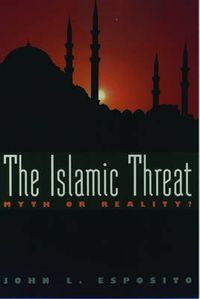
1 säljare
The Islamic Threat Upplaga 2
Are Islam and the West on an inevitable collision course? What are the implications of events in Algeria, Egypt, Saudi Arabia, Pakistan, and the West? Recent events such as the World Trade Center bombing, Algeria's civil war and the fundamentalist Islamic government that might follow,
Sunni-Shii fratricide in Pakistan, and reports of terrorist networks with bases in the West only enhance the Western view of Muslims as medieval fanatics, and feed talk of an impending clash of civilizations. From the Ayatollah Khomeini to Saddam Hussein and Sheik Abdul Rahman, the image of Islam
as a militant, expansionist, and rabidly anti-American religion has gripped the minds of Western governments and media. But these perceptions, John L. Esposito writes, stem from a long history of mutual distrust, criticism, and condemnation, and they are far too simplistic to help us understand one
of the most important issues of our times.
In this second edition of The Islamic Threat: Myth or Reality? Esposito, a leading expert in political Islam, analyzes the fall out from these recent events from North Africa to Southeast Asia and places the challenge of Islam in critical perspective. Exploring the vitality of Islam as a global
force and the history of its relations with the western world, Esposito investigates just how pervasive the threat of Muslim radicalism actually is. He offers a systematic assessment of politics in key nations (including Algeria, Egypt, Iran, Pakistan, Libya, Lebanon, Sudan, and Tunisia) and in
particular Islamic movements (from moderates to radicals), demonstrating the diversity of the Islamic resurgence--and the mistakes western analysts make in assuming a hostile, monolithic Islam. Esposito examines the potential challenge or threat of Islam and looks at the issues facing Islam and the
West in the 1990s, from democratization and pluralism to American foreign policy, human rights, and the status of women and minorities in the context of Islamic revivalism.
Timely and compelling, The Islamic Threat is essential reading for all those interested in "overcoming the increasingly dangerous gap separating Western and Islamic societies."
Upplaga: 2a upplagan
Utgiven: 1995
ISBN: 9780195102987
Förlag: Oxford University Press
Format: Häftad
Språk: Svenska
Sidor: 292 st
Are Islam and the West on an inevitable collision course? What are the implications of events in Algeria, Egypt, Saudi Arabia, Pakistan, and the West? Recent events such as the World Trade Center bombing, Algeria's civil war and the fundamentalist Islamic government that might follow,
Sunni-Shii fratricide in Pakistan, and reports of terrorist networks with bases in the West only enhance the Western view of Muslims as medieval fanatics, and feed talk of an impending clash of civilizations. From the Ayatollah Khomeini to Saddam Hussein and Sheik Abdul Rahman, the image of Islam
as a militant, expansionist, and rabidly anti-American religion has gripped the minds of Western governments and media. But these perceptions, John L. Esposito writes, stem from a long history of mutual distrust, criticism, and condemnation, and they are far too simplistic to help us understand one
of the most important issues of our times.
In this second edition of The Islamic Threat: Myth or Reality? Esposito, a leading expert in political Islam, analyzes the fall out from these recent events from North Africa to Southeast Asia and places the challenge of Islam in critical perspective. Exploring the vitality of Islam as a global
force and the history of its relations with the western world, Esposito investigates just how pervasive the threat of Muslim radicalism actually is. He offers a systematic assessment of politics in key nations (including Algeria, Egypt, Iran, Pakistan, Libya, Lebanon, Sudan, and Tunisia) and in
particular Islamic movements (from moderates to radicals), demonstrating the diversity of the Islamic resurgence--and the mistakes western analysts make in assuming a hostile, monolithic Islam. Esposito examines the potential challenge or threat of Islam and looks at the issues facing Islam and the
West in the 1990s, from democratization and pluralism to American foreign policy, human rights, and the status of women and minorities in the context of Islamic revivalism.
Timely and compelling, The Islamic Threat is essential reading for all those interested in "overcoming the increasingly dangerous gap separating Western and Islamic societies."
Begagnad bok
145 kr
Fri frakt & skickas inom 1-3 vardagar
Köpskydd med Studentapan
Varje köp täcks av Studentapans köpskydd som säkerställer att boken kommer fram, att du får rätt bok och att skicket stämmer överens med beskrivning.



